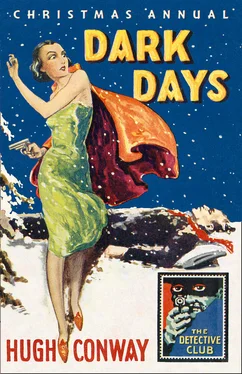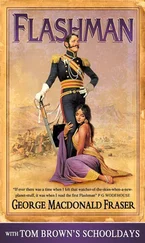Then I drew out Sir Mervyn Ferrand’s letter, read it again and again, and cursed the writer in my heart.
William was away about two hours; then he made his appearance with some boxes. I was delighted to see these tangible signs that Philippa meant to keep her promise. Till that moment I had been troubled by something like the doubt, that after all she might, upon calm reflection, rescind the resolution formed in her excitement. Now her coming seemed to be a certainty.
Nevertheless, William brought no message; so there was nothing for me to do but wait patiently until she chose to cross my threshold.
Although my pleasing labours of love were ended, I was not left idle. There was another task to be done today. I set my teeth and sat down, thinking quietly as to the way in which it might be best performed. Tonight I meant to stand face to face with that black-hearted scoundrel known as Sir Mervyn Ferrand!
I consulted the time-table. His letter named no particular hour; but I saw that if he carried out his expressed intention of being here tonight, there was but one train by which he could come; there was but one way from Roding to the house at which Philippa had been staying. He meant to walk, his letter said; this might be in order to escape observation. The train was due at Roding at seven o’clock. The weather was cold; a man would naturally walk fast. Mrs Wilson’s house must be four miles from the station. Let me start from there just before the train arrives, and I should probably meet him about half-way on his journey. It would be dark, but I should know him. I should know him among a thousand. There on the open lonely road Sir Mervyn Ferrand, coming gaily, and in his worldly cynicism certain of cajoling, buying off, or in some other way silencing the woman who had in an evil day trusted to his honour and love, would meet, not her, but the man who from the first had sworn that a wrong to Philippa should be more than a wrong to himself! He would meet this man, and be called to account.
Stern and sinister as were my thoughts—freely and unreservedly as I record them: as indeed I endeavour in this tale to record everything—I do not wish to be misjudged. It is true that in my present mood I was bent upon avenging Philippa with my own hand; true that I meant, if possible, to take at some time or another this man’s life; but at least no thought of taking any advantage of an unarmed or unsuspecting man entered into my scheme of vengeance. I designed no murderous attack. But it was my intention to stop the man on his path; to confront him and tell him that his villainy was known to me; that Philippa had fled to me for aid; that she was now in my custody; and that I, who stood in the position of her brother, demanded the so-called satisfaction which, by the old-fashioned code of honour, was due from the man who had ruthlessly betrayed a woman. Well I knew that it was probable he would laugh at me—tell me that the days of duelling were over, and refuse to grant my request. Then I meant to see if insults could warm his noble blood; if my hand on his cheek could bring about the result which I desired. If this failed, I would follow him abroad, cane him and spit upon him in public places.
A wild scheme for these prosaic law-abiding days; yet the only one that was feasible. It may be said that I should have taken steps to have caused the miscreant to be arrested for bigamy. But what proof of his crime had we as yet, save his own unsigned confession? Who was to move in the matter—Philippa—myself? We did not even know where this wife of whom he had spoken lived, or where she died. There were a hundred ways in which he might escape from justice, but whether he was punished for his sin or allowed to go scot-free, Philippa’s name and wrongs must be bruited about, her shame made public. No; there was but one course to take, and but one person to take it. It rested with me to avenge the wrongs of the woman I loved by the good old-fashioned way of a life against a life.
Truly, as I said, I had now plenty to live for!
The hours went by, yet Philippa came not. I grew restless and uneasy as the dusk began to make the road, up which I gazed almost continually, dim and indistinct. When the short winter’s day was over, and the long dark night had fairly begun, my restlessness turned into fear. I walked out of my house and paced my garden to and fro. I blamed myself for having yielded so lightly to Philippa’s wish—her command rather—that I should on no account fetch her. But then, whenever did I resist a wish, much less a command, of hers? Oh, that I had been firm this once!
The snow-storm of the previous evening had not lasted long—not long enough to thoroughly whiten the world. The day had been fine and frosty, but I knew that the wind had changed since the sun went down. It was warmer, a change which I felt sure presaged a heavy downfall of snow or rain. There was a moon, a fitful moon; for clouds were flying across it, dark clouds, which I guessed would soon gather coherence and volume, and veil entirely that bright face, which now only showed itself at irregular intervals.
The minutes were passing away. I grew nervous and excited. Why does she not come? My hope had been to see my poor girl safely housed before I started to execute my other task. Why does she not come? Time, precious time, is slipping by! In the hope of meeting her, I walked for some distance up the road. ‘Why does she delay?’ I groaned. Even now I should be on my way to Roding, or I may miss my prey. Heavens! Can it be that she is waiting to see this man once more? Never! Never! Perish the thought!
But, all the same, every fibre in my body quivered at the bare supposition of such a thing,
I could bear the suspense no longer. For the hundredth time I glanced at my watch. It wanted but ten minutes to seven o’clock, and at that hour I had resolved to start from Mrs Wilson’s, on my way to Roding. Yet now I dared not leave my own house. Any moment might bring Philippa. What would she think if I was not there to receive and welcome her?
Five more precious moments gone! I stamped in my rage. After all, I can only do one half of my task; the sweet, but not the stern half. Shall I, indeed, do either? The train must now be close to Roding. In an hour everything may be lost. The man will see her before she leaves the house. He will persuade her. She will listen to his words; for did he not once love her? He must have loved her! After all, he broke the laws for the sake of possessing her, and—cursed thought!—she loved him then; and she is but a woman!
So I tortured myself until my state of mind grew unbearable. At all hazard I must prevent Ferrand from meeting Philippa. Oh, why had she not come as she promised? Could it be she was detained against her will? In spite of her uninterested manner, I distrusted the woman I had seen last night. It is now past seven o’clock. Philippa’s house, from which I had reckoned my time, was nearly three miles away. I must give up my scheme of vengeance. I must go in search of Philippa. If I do not meet her I must call at Mrs Wilson’s, find out what detains her, and if needful bear her away by force.
By this time my steps had brought me back to my own house. I called William, and told him I was going to walk up the road and meet my expected guest. If by any chance I should miss her, he was to welcome her on my behalf, and tell her the reason for my absence.
‘Best take a lantern, sir,’ said William; ‘moon’ll soon be hidden, and them roads is precious rough.’
‘I can’t be bothered with that great horn affair,’ I said, rather testily.
‘Take the little one—the bull’s-eye—that’s better than nothing,’ said William. To humour him I put it into my pocket.
I ran at the top of my speed to the house at which I had last night left Philippa. It took me nearly half an hour getting there. I rang the bell impetuously. The door was opened by a maidservant. I enquired for Mrs Farmer, knowing that Philippa had passed under this name to all except her hostess. To my surprise I was told that she had left the house, on foot and alone, some little while ago. The maid believed she was not going to return, as her luggage had that morning been sent for.
Читать дальше












